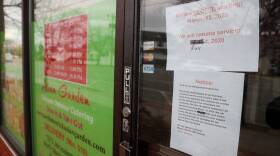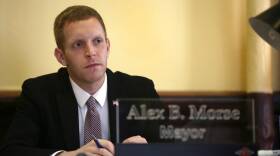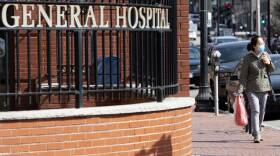EXPLORE MORE
Thursday on BPR:
Former Massachusetts Secretary of Public Safety Andrea Cabral
Jeremy Ben-Ami, Founder and President of J Street
MIT economist Jon Gruber
Former Obama White House Social Secretary Deesha Dyer, and The Women's Edge CEO Elizabeth Hailer
Recent segments
-
Sue O'Connell Denounces Jared Kushner's Role In Trump Administration Coronavirus Response
O'Connell pointed to Kushner's lack of background in public health or government. -
Corby Kummer: The Restaurateur Dilemma During Coronavirus
Legal liability will be better for restaurants that close down, Kummer said, but many are trying to stay open. -
Village Voice: Poems For Social Distancing
"When things are really bad, poets always find the good thing," said Richard Blanco. -
Alex Beam's New Book Reveals The Rocky History Behind The Farnsworth House
In "Broken Glass: Mies Van Der Rohe, Edith Farnsworth, and the Fight Over a Modernist Masterpiece,” Beam explores the relationship between architect and client. -
Holyoke Mayor Morse Discusses Deaths At Veterans Center
Following an outbreak of COVID-19 at The Soldiers’ Home, a veterans center in Holyoke, at least fifteen individuals have been confirmed as dead. At least six of the dead tested positive for COVID-19 while six others are awaiting test results. -
Dr. Gary Gottlieb Pitches His Plan For Massachusetts Healthcare In The COVID-19 Fight
The former Partners in Health CEO called for the rapid expansion of the state's Mobile Integrated Health program.
Listen to previous shows
-

Paul Reville: Schools Can't Open With Zero Risk Of COVID-19 Spread. So How Much Risk Are We Willing To Take To Send Our Kids To Class This Fall?
As some schools and colleges opt for in-person learning this fall, Paul Reville told Boston Public Radio on Thursday that even with concerns about COVID-19 spread in classrooms and dorms, society has to accept some level of risk in order to deliver its mandate to provide an education to people. “We’re not sure what’s going to happen, but we’ve got to be vigilant and we’ve got to be able to react quickly if things start to get out of hand,” he said. “It’s all a matter of risk tolerance. The notion that we’re going to get to zero risk is just totally unrealistic, none of us have zero risk in our day to day lives.” Reville is former Secretary of Education and a professor at Harvard University’s Graduate School of Education where he also runs the Education Redesign Lab. His latest book, co-authored with Elaine Weiss, is “Broader, Bolder, Better: How Schools and Communities Help Students Overcome the Disadvantages of Poverty.” -

Juliette Kayyem: How To Handle A Hurricane Amid A Pandemic
Homeland security expert Juliette Kayyem spoke with Boston Public Radio on Wednesday about Hurricane Laura, a Category 4 storm headed toward the Texas and Louisiana coasts. “You have to shelter differently because of COVID, so there’s a mandatory masking policy by all organizations who are running shelters,” she said. “It does not matter what a governor or local official says - no mask, no shelter, and I think that’s exactly right.” Kayyem is an analyst for CNN, former assistant secretary at the Department of Homeland Security and faculty chair of the homeland security program at Harvard University’s Kennedy School of Government. -

BPR Full Show 8/26/20: Defining Leadership
Today on Boston Public Radio: We opened lines to hear your impressions from night two of the Republican National Convention. Former Trump Campaign Manager Corey Lewandowski gave his take on nights one and two of the RNC, and defended his stance that President Trump deserves four more years in office. CNN analyst and national security expert Juliette Kayyem discussed the heightened challenges of navigating Hurricane Laura and other storms during the coronavirus pandemic, and the worrying rise in political influence from proponents of the QAnon conspiracy theory. MIT economist and Affordable Care Act architect Jonathan Gruber discussed why public services function better outside of the private sector, and weighed in on the economic and political factors that are creating issues at the U.S.P.S Nancy Koehn talked about the key components of crisis leadership, and reflected on how national and global leaders have handled the COVID-19 crisis. Koehn is a Harvard Business School historian and author of “Forged in Crisis: The Power of Courageous Leadership in Turbulent Times.” Medical ethicist Art Caplan discussed problems with President Trump's Right to Try Act, which was touted at Tuesday night’s RNC, and talked about new research indicating around half of K-12 teachers in the US have definite or possible risk factors for contracting serious cases of COVID-19. -

BPR Full Show 8/25/20: Your Questions on Vote By Mail, Answered
Today on Boston Public Radio: We opened our lines to hear your take on night one of the Republican National Convention. NBC Sports Boston reporter and anchor Trenni Kusnierek discussed institutional racism in New England's collegiate sports, 77 false positive COVID-19 tests in the NFL, and a recent statement from NFL commissioner Roger Goodell, who said he should have “listened earlier” to Colin Kaepernick. Mass. State Senator Becca Rausch talked about the successes and setbacks of mail-in voting in Mass., and responded to questions and comments from listeners. Ali Noorani, Executive Director for the National Immigration Forum, discussed unfair assumptions about foreign-born voters in the U.S., and concerns about the looming furlough of 70% of employees at the U.S Citizenship and Immigration Services. Former New Hampshire GOP chair and Lincoln Party co-founder Jennifer Horn talked about her impressions from night one of the RNC, and her PAC’s latest anti-Trump ad, titled “Evil.” CNN Chief National Correspondent John King reflected on night one of the RNC, and news of White House counselor Kellyanne Conway’s exit from the Trump administration at the end of August. We opened our lines to talk with listeners about your experiences dealing with Monday's widespread Zoom outages. -

Ali Noorani: How Naturalized Citizens Can Affect Elections
Ali Noorani spoke with Boston Public Radio on Tuesday about the impact of naturalized immigrants on voting in 2020. “It’s in really important parts of the country where you see the share of eligible voters who are foreign-born really skyrocket,” he said. “48 percent of eligible voters in Miami-Dade, Florida are foreign-born, and 22 percent of eligible voters in Fort Bend, Texas are foreign-born; So Georgia, Texas, and South Florida are communities that are going to see a disproportionate impact of foreign-born voters this November.” Ali Noorani is Executive Director of the National Immigration Forum, his latest book is There Goes the Neighborhood: How Communities Overcome Prejudice and Meet the Challenge of American Immigration.








